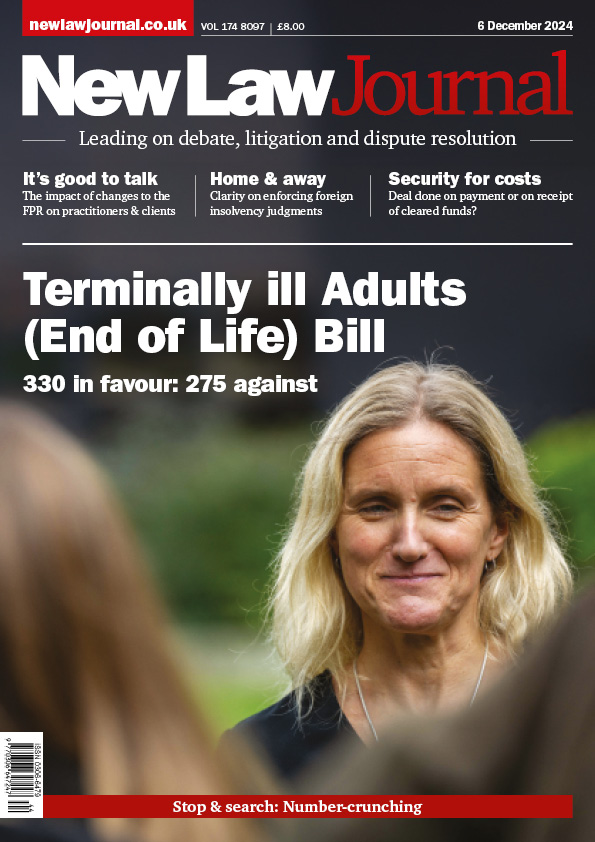THIS ISSUE

Foreign judgments can serve as the basis for bankruptcy or winding-up petitions even if not formally recognised in the courts of England and Wales, two recent judgments confirm. However, the process is not automatic, as Lauren Pardoe, partner, and Camilla Pratt, senior associate, in Rosling King’s dispute resolution group, write in this week’s NLJ.
The Family Procedure Rules (FPR) have changed. In this week’s NLJ, David Emmerson, partner at Anthony Gold, takes a detailed look at the new rulebook, particularly the powers granted by Pt 3 on case management and the use of non-court dispute resolution procedures.
The vital question of when exactly security is deemed received—whether it is on payment or on receipt of cleared funds—is addressed in this week’s NLJ, by Avneet Baryan, senior associate at Mills & Reeve.
The Terminally Ill Adults (End of Life) Bill, if passed into law in its current form, would ‘create the most tightly regulated regime, with the most safeguards, in the world where access to assisted dying is legal’, writes James Lister, partner at Stevens & Bolton, in this week’s NLJ.
How exactly are the police using their stop and search powers? In this week’s NLJ, Neil Parpworth of Leicester de Montfort University crunches the numbers and drills into the detail to uncover a less-than-rosy picture.
Bringing the assisted dying Bill into force will involve navigating a legal & ethical minefield, says James Lister
Neil Parpworth delves deep into the latest data to determine how the police are using stop & search powers
Changes to the FPR are resulting in more referrals to mediation. David Emmerson OBE explores the new provisions & their impact on practitioners & clients
The courts have provided welcome clarity on enforcing foreign judgments in English insolvency proceedings: Lauren Pardoe & Camilla Pratt outline the opportunities & challenges
Gustavo Moser sheds light on the nuances of negotiating & enforcing force majeure clauses
MOVERS & SHAKERS

Keystone Law—Milena Szuniewicz-Wenzel & Ian Hopkinson
International arbitration team strengthened by double partner hire

Coodes Solicitors—Pam Johns, Rachel Pearce & Bradley Kaine
Firm celebrates trio holding senior regional law society and junior lawyers division roles

Michelman Robinson—Sukhi Kaler
Partner joins commercial and business litigation team in London
NEWS
The government has pledged to ‘move fast’ to protect children from harm caused by artificial intelligence (AI) chatbots, and could impose limits on social media as early as the summer
All eyes will be on the Court of Appeal (or its YouTube livestream) next week as it sits to consider the controversial Mazur judgment
An NHS Foundation Trust breached a consultant’s contract by delegating an investigation into his knowledge of nurse Lucy Letby’s case
Draft guidance for schools on how to support gender-questioning pupils provides ‘more clarity’, but headteachers may still need legal advice, an education lawyer has said
Litigation funder Innsworth Capital, which funded behemoth opt-out action Merricks v Mastercard, can bring a judicial review, the High Court ruled last week







